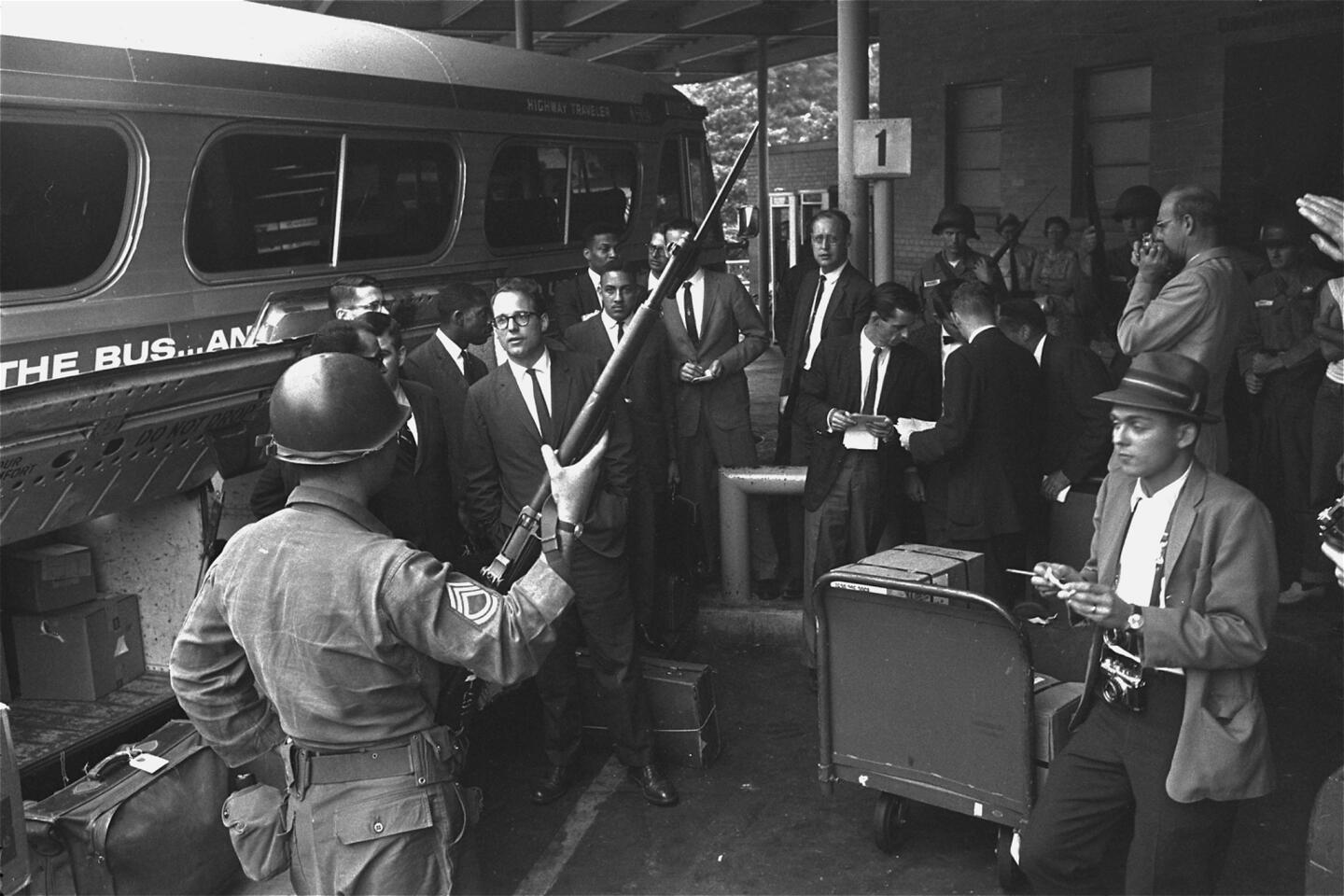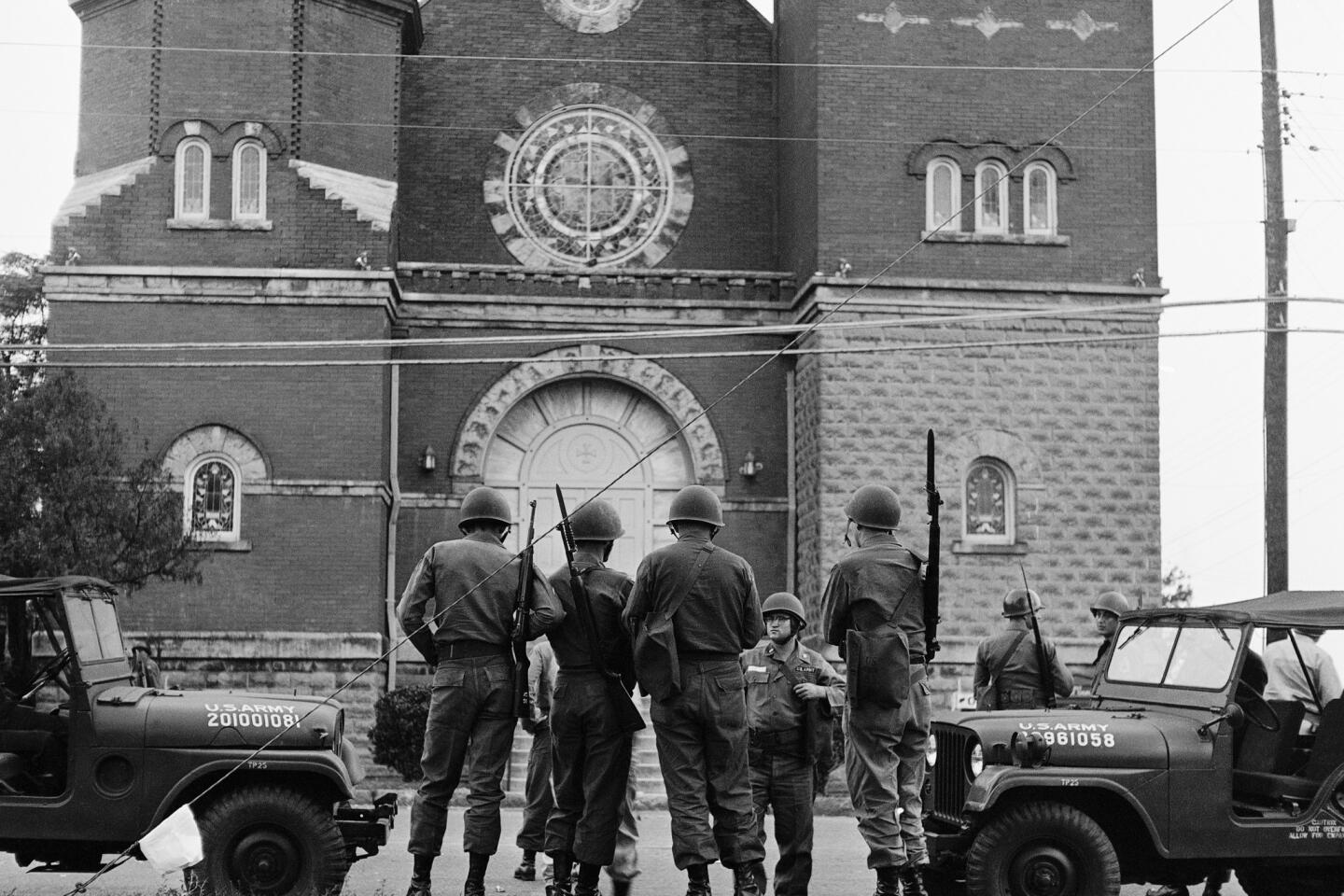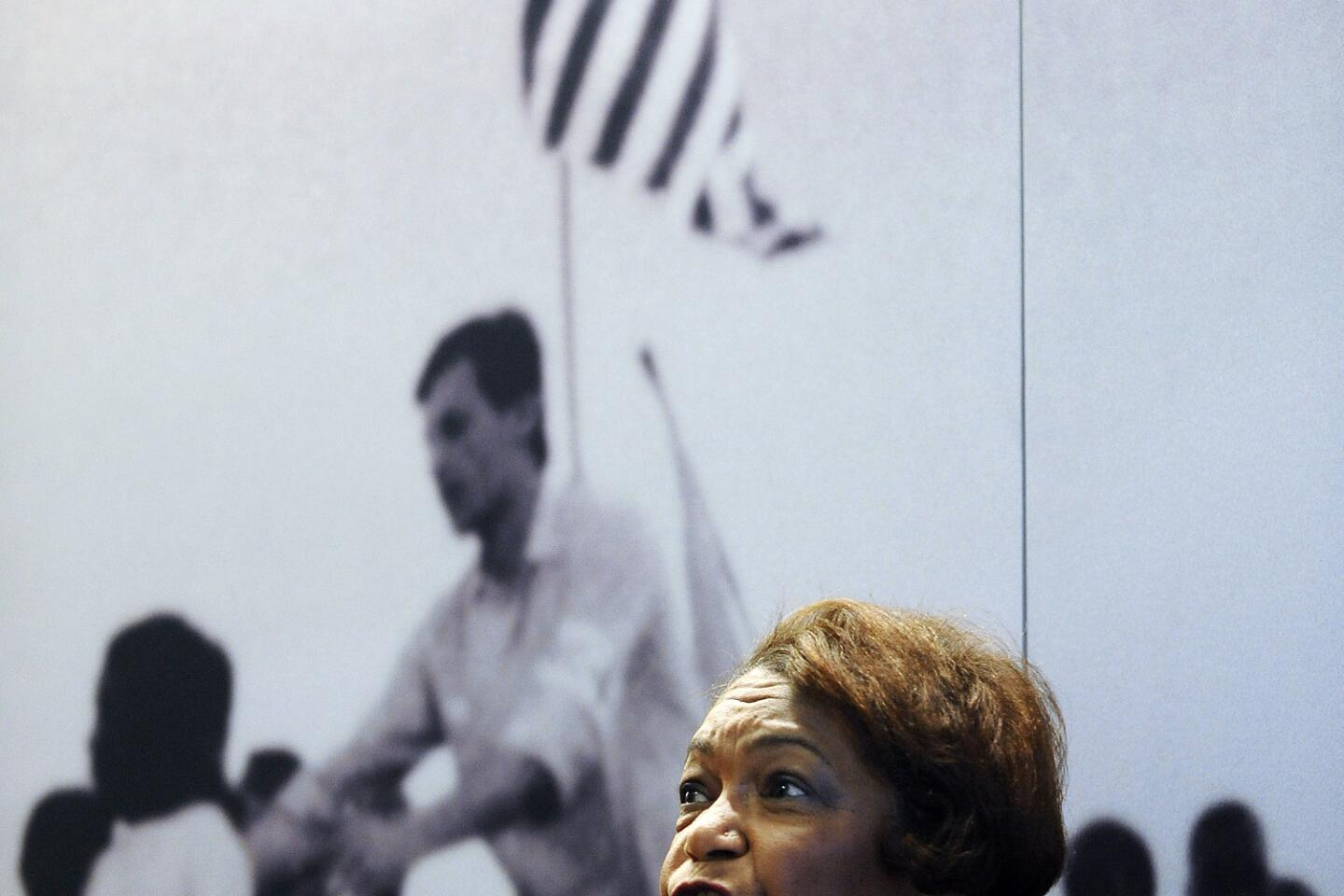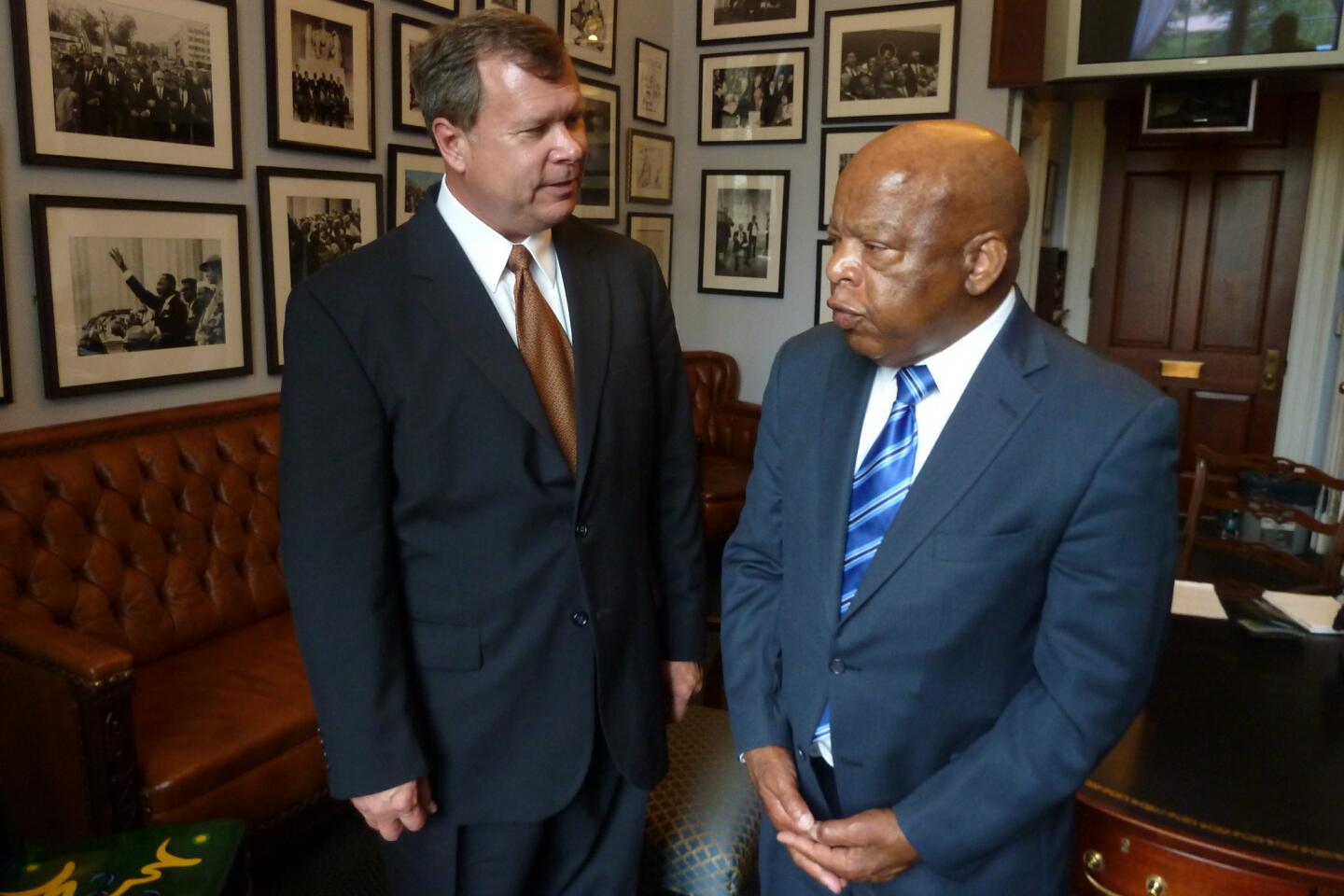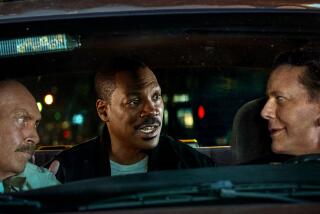Great Read: Police chief’s apology sows healing, friendship
MONTGOMERY, Ala. — The phone call that changed Police Chief Kevin Murphy’s life came late on a Friday afternoon last year: The mayor of this cordial Southern capital asked him to greet a delegation arriving the next morning from Washington.
The visitors were led by John Lewis, a veteran Georgia congressman and civil rights activist who witnessed one of Montgomery police’s lowest moments as he and other Freedom Riders traveled the South challenging Jim Crow laws.
On May 20, 1961, they were brutally beaten here by a crowd of 1,000 whites carrying rocks, bottles, even a pitchfork. Someone smashed Lewis over the head with a wooden Coca-Cola crate.
The next day, the Rev. Martin Luther King Jr. held a service at First Baptist Church here attended by 1,500 people in honor of the Freedom Riders. That afternoon, another white mob appeared — setting cars on fire and cutting electrical lines to the church.
The Alabama National Guard was eventually sent to lead weary blacks from the church.
Both days, Montgomery police were nowhere to be found.
Murphy was born a year after those troubled times, and as police chief he had worked to build bridges with the city’s black community. He knew the department had evolved; what he lacked was a way to show this was not the same racist Montgomery police force of 1961.
That Saturday in March 2013, he stood in his crisp blue uniform as Lewis’ delegation arrived, including Rep. Sheila Jackson Lee (D-Texas).
Murphy, now 51, recalled Jackson Lee saying, “Chief, I want you to know I feel very nervous in the presence of your department today.”
“I understand,” Murphy responded softly.
And he thought: “Maybe that’s about to change.”
No one — not Murphy’s wife, not the department, not even his boss, the mayor — knew what would come next.
::
Born in Tacoma, Wash., Kevin Murphy was an Army brat who at age 7 landed in rural Ozark, Ala. As Northerners, the family was shocked by the racism they witnessed in Alabama.
Murphy’s first lesson in Southern-style equality came when his father, John, told him that mixed-race couples were not allowed to be stationed at nearby Ft. Rucker.
That’s just the way it was in the South in 1970.
At family dinners, Murphy and his twin brother, Patrick, saw their parents’ discomfort as they condemned the vocabulary of racism they heard all around them: The N-word. And worse.
Years later, Murphy joined the Ozark Police Department, where he worked with his mother, Ruth, who assisted at-risk children. He moved to the Montgomery police force in 1986 and rose through the ranks to become chief in 2010.
He immediately dropped the department’s traditional uniform patch, which featured the city seal promoting Montgomery as the “Cradle of the Confederacy.”
Over the years, he’d seen racial barriers crumble among his fellow officers, with blacks promoted to top jobs, even chief of police. But tensions remained between white officers and black residents; there were claims of excessive force and unlawful shootings.
Murphy knew younger white patrol officers had little idea of past tensions that would make elderly blacks uneasy in their presence. So he created “Policing in a Historic City,” a seminar that examined decades-old transgressions involving race — including the 1961 Freedom Riders attack.
The class, mandatory for the department’s 530 sworn officers and 200 civilians, included a lecture, slide show and tour of the local Rosa Parks Museum.
“How can you evolve into something better,” asked Murphy, a solemn man with an easy Southern drawl, “unless you discuss where you’ve been?”
The move paid dividends: Young white officers told him they had a new perspective when they approached black residents. Police complaints dropped.
Still, Murphy knew more could be done. For years, he was aware that Lewis would return each spring to civil rights battlegrounds across the Deep South — including First Baptist Church.
Lewis wanted to keep the spirit of the civil rights movement alive — and remind Americans of the racism of the past. But Murphy saw that none of the veteran officers on his force ever wanted to talk about the department’s past race relations, even in the seminars he’d started.
He found that unsettling.
::
The chief didn’t have to travel far that Saturday to meet Lewis’ delegation: The First Baptist Church sits directly across the street from police headquarters, built in 1967.
He waited until the reporters left before taking the microphone in front of the crowd of 200 people. He joked about Alabama’s sultry spring weather and heavy fried food.
Then the chief got serious. He looked at Lewis in the front row.
“I want to apologize,” he began. “We failed to protect you and the other Freedom Riders. In 1961, Montgomery police were not very good to you. But today, we’re a better department.”
The room fell silent for several seconds. Then came a collective gasp.
Murphy’s private moment didn’t last long: Someone turned on a cellphone camera and recorded what happened next. It’s included in a documentary posted on YouTube, “The Apology Heard Around the World.”
Lewis stood and embraced the chief. “I was trying hard,” Lewis said later, “to hold back my tears.”
He turned to sit down, but Murphy stopped him. There was something else: The chief took off his shiny badge and gave it to the veteran activist — a symbol of police oppression turned into one of reconciliation.
“Chief, you can’t do that,” Lewis said. “Don’t you need your badge?”
Murphy whispered: “I can get another one.”
Then someone stood and led the crowd in a song that was a mainstay of the civil rights movement: “We Shall Overcome.”
::
Murphy got hundreds of letters and emails from around the world. He answered them all, including one from Mary Ellen Noone, who was inside First Baptist Church that day in 1961.
Apologizing on behalf of those “who would not protect us” spoke volumes, she wrote. “Nobody has ever done that.”
Lewis sent his own letter: “It is not easy to confront dark moments in our past. Harder still is to try and atone for sins not our own. But you showed your own special courage that day at First Baptist Church, and I will be forever grateful.”
The apology had “brought comfort to my soul,” he wrote. Lewis signed the letter: “I am proud to call you my friend. I am proud to call you my brother.”
He now often carries the badge with him.
In the following months, the two ran into each other twice in the Atlanta airport. Lewis would pull Murphy aside to introduce him as his friend — to companions, and even strangers seeking the congressman’s autograph.
Lewis invited Murphy to the White House this March for St. Patrick’s Day. The legislator escorted the chief to the front of the receiving line to meet President Obama. Murphy recalled that the president told him that he was a good man and that he’d done a good thing.
A month later, Murphy accepted Lewis’ invitation to join him and a small delegation to Ireland and Northern Ireland, to speak to Catholics and Protestants on their religious divide.
Murphy had never been to Europe. The immigration stamp he received entering Ireland was only the second on his passport; the other came on a vacation to Jamaica.
Murphy kept his distance in Ireland as Lewis was mobbed by well-wishers. Each time, the lawmaker beckoned the police chief for introductions. “People treated him like a rock star,” Murphy said. “He could have just forgotten about me. He never did.”
In Derry, Northern Ireland, Murphy spoke of his apology. Lewis warned that new laws didn’t bring immediate progress: “It takes longer to change the hearts and minds of men.”
That day, someone surprised the speakers with gifts — framed photos of them on the day of the chief’s apology: Word of Murphy’s amends had even crossed the Atlantic.
Both men addressed a graduation ceremony in July for the FBI Academy; Murphy had attended classes at its Quantico, Va., training facility.
The day of the speech, Murphy sat in Lewis’ Washington office, a bastion with walls covered by black-and-white photos of King, Robert F. Kennedy and Mahatma Gandhi. An old campaign poster showed a pair of wrinkled black hands casting a ballot.
“Hands that pick cotton can now pick our public officials,” it reads.
Lewis, a stout man with a preacher’s delivery, touched Murphy’s arm. “I love him like a brother,” he said. “For this young white police officer — who wasn’t even born in 1961, wasn’t even a dream — to do such a thing.” His voice broke off. “He spoke from the gut, from the depths of his soul.”
For Murphy, the relationship also runs deep. He sees the 74-year-old Lewis as his mentor. A father figure.
Lewis took the police chief on his rounds, bringing him onto the House floor, introducing him to legislators as “my friend, Kevin Murphy.”
::
A little over a year after the apology, this June, Murphy was ousted by Montgomery Mayor Todd Strange. The mayor attributed the dismissal to Murphy’s management style. Murphy said he lost a power struggle with the city’s director of public safety. Both men said the apology was not a factor.
Murphy is now pondering a run next year for Montgomery mayor. He told Lewis, and the politician gave him his support.
Murphy thinks that as mayor, he could encourage more conversations between the races in the city where slave auctions were once held, where Rosa Parks made her courageous stand for a right to keep a bus seat, where John Lewis marched.
He sees more people talking about race these days here, even the young.
Not long ago, as he worked in his home office, Murphy overheard his grandson talking with another child as they shot baskets in the driveway. Like Lewis and Murphy, they are friends — one white, one black.
“You know, if it weren’t for Martin Luther King, we wouldn’t be playing here today,” the black kid said.
Murphy’s grandson took a shot and then said: “Yeah, you’re right.”
Murphy later walked into the kitchen and told his wife: “Those two boys are the smartest adults I know.”
Twitter: @jglionna
More to Read
Sign up for Essential California
The most important California stories and recommendations in your inbox every morning.
You may occasionally receive promotional content from the Los Angeles Times.
